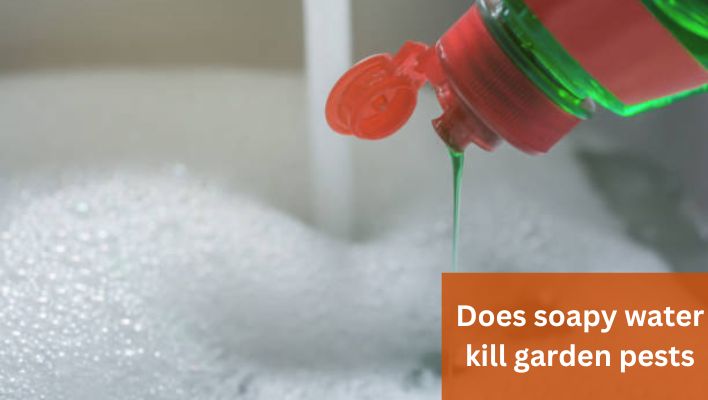Gardening can be a wonderful way to connect with nature and cultivate your food or flowers. However, it can also be a frustrating experience when your plants are attacked by pests like aphids, mealybugs, or spider mites.
While chemical pesticides are often the first solution that comes to mind, they can have negative effects on the environment and your health. That’s where natural pest control methods like soapy water come in.
In this article, we’ll explore the question that many gardeners ask: does soapy water kill garden pests? We’ll discuss the science behind this simple yet effective method, and explain how you can use it to protect your plants from harmful insects.
We’ll also cover some of the most common garden pests that can be eliminated with soapy water, and provide tips for making and applying your soapy water insecticide.
But before we dive into the details, let’s talk about the importance of using eco-friendly pest control methods. By avoiding harmful chemicals, you can help preserve the balance of your garden’s ecosystem, protect the health of your family and pets, and even save money in the long run. So, let’s get started and learn how to fight pests the natural way!
What is Soapy Water insecticide?
Soapy water is a solution made by mixing water with soap. The soap helps to break down the surface tension of the water, making it easier to spread and allowing it to penetrate the exoskeletons of insects. When insects come into contact with soapy water, the solution suffocates them by clogging their breathing pores, leading to their demise.
There are many different types of soap that can be used to make soapy water, including dish soap, laundry detergent, and castile soap. However, not all soaps are equally effective for controlling garden pests. For example, some soaps may contain additives or fragrances that can harm plants or beneficial insects. It’s important to choose a soap that is mild, biodegradable, and free of harmful chemicals.
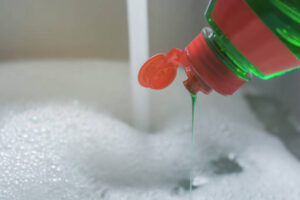
Dawn dish soap is often the go-to choice for making soapy water insecticide, as it is readily available and affordable. However, some gardeners prefer to use castile soap, which is made from natural ingredients like olive oil or coconut oil and is gentler on plants and insects. Whatever soap you choose, make sure to use a small amount and dilute it with water to create a mild solution. Too much soap can burn or damage your plants.
In general, soapy water is effective against soft-bodied insects like aphids, mealybugs, spider mites, and whiteflies, and many more. It may also help to deter some other pests like slugs or snails. However, it may not be as effective against hard-shelled insects like beetles or grasshoppers. In those cases, you may need to use a different method of control.
Soapy water is a simple and natural solution for controlling many common garden pests. By using a mild soap and diluting it properly, you can protect your plants without harming the environment or beneficial insects.
How soapy water works to kill pests
Soapy water works as a natural pesticide by suffocating insects and disrupting their cell membranes. When insects come into contact with soapy water, the solution breaks down the waxy protective layer on their exoskeletons and penetrates their bodies.
The soap then interferes with the insect’s ability to regulate water, causing it to lose moisture and ultimately leading to its death.
Benefits of Using Soapy Water as a Natural Pesticide
Using soapy water as a natural pesticide offers a range of benefits for gardeners, including:
- Non-Toxic: Unlike chemical pesticides, soapy water is non-toxic and safe for people, pets, and beneficial insects when used correctly. It does not leave harmful residues on plants, soil, or the environment, making it an eco-friendly option for pest control.
- Cost-Effective: Soapy water is a cost-effective solution for pest control as it requires only a few simple ingredients that are readily available at home. This makes it a budget-friendly option for gardeners who do not want to spend a lot of money on pest control.
- Easy to Use: Soapy water is easy to use and requires no special equipment or expertise. You can make it by simply mixing soap and water and applying it to affected areas with a spray bottle or sponge. This makes it a convenient option for gardeners who want to avoid complex pest control methods.
- Effective Against Soft-Bodied Insects: Soapy water is highly effective against soft-bodied insects like aphids, mealybugs, and spider mites. It can also deter other pests like slugs and snails. This makes it a versatile option for gardeners who want to control a range of pests without using chemical pesticides.
- Helps Preserve Ecosystem Balance: By avoiding chemical pesticides, soapy water helps to preserve the balance of your garden’s ecosystem. It protects beneficial insects like bees, ladybugs, and butterflies, which play a crucial role in pollination and pest control.
Using soapy water as a natural pesticide is a safe, effective, and eco-friendly way to control garden pests. It is also an affordable and easy-to-use option for gardeners who want to avoid harsh chemicals and preserve the balance of their garden’s ecosystem.
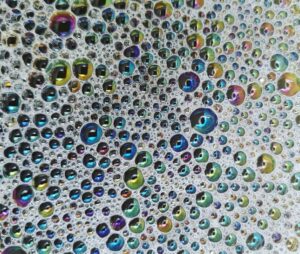
What pests can be controlled with soapy water?
Soapy water is an effective natural pesticide that can control a range of garden pests, especially soft-bodied insects. Here are some common pests that can be controlled with soapy water:
- Aphids: These tiny, pear-shaped insects feed on the sap of plants and can cause damage to leaves and flowers. They are usually found on the undersides of leaves and can cause curling and yellowing of leaves, stunted growth, and wilting. Soapy water can help to control aphids by suffocating them and disrupting their feeding.
- Mealybugs: These soft-bodied insects are covered in a white, powdery substance and feed on the sap of plants. They can cause yellowing of leaves, stunted growth, and plant deformities. Soapy water can help to control mealybugs by coating their bodies and blocking their breathing pores.
- Spider Mites: These tiny, spider-like pests feed on the undersides of leaves and can cause yellowing and stippling of foliage. Soapy water can help to control spider mites by suffocating them and disrupting their feeding.
- Whiteflies: These tiny, moth-like insects feed on the undersides of leaves and can cause yellowing and stunted growth of plants. Soapy water can help to control whiteflies by coating their bodies and disrupting their feeding.
- Slugs and Snails: These mollusks feed on the leaves of plants and can cause significant damage to crops. Soapy water can help to control slugs and snails by repelling them and reducing their activity.
- Thrips: These tiny insects have elongated bodies and feed on the sap of plants. They can cause discoloration and deformation of leaves and flowers. Soapy water can help to control thrips by suffocating them and disrupting their feeding.
- Scale Insects: These small, immobile insects can appear as bumps on the leaves and stems of plants. They feed on the sap of plants and can cause yellowing and premature dropping of leaves. Soapy water can help to control scale insects by coating their bodies and blocking their breathing pores.
- Earwigs: These nocturnal insects have long, slender bodies and pincers on their tails. They feed on plants and can cause damage to leaves and flowers. Soapy water can help to control earwigs by suffocating them and repelling them from plants.
- Japanese Beetles: These metallic green and brown beetles feed on the leaves and flowers of plants and can cause extensive damage. Soapy water can help to control Japanese beetles by suffocating them and disrupting their feeding.
In most cases, soapy water affects garden pests by suffocating them and disrupting their feeding, leading to their death. It can be an effective and eco-friendly way to control a range of garden pests, including soft-bodied insects, scale insects, caterpillars, earwigs, and Japanese beetles.
It is important to note that while soapy water is a natural pesticide, it should still be used with caution and in moderation to avoid damaging the plants or disrupting the ecosystem balance of the garden.
Tips for Identifying Garden Pests
To identify garden pests, look for signs of damage on your plants, such as yellowing, curling, or wilting of leaves. You can also inspect the undersides of leaves for signs of pests or their eggs. Some pests, like aphids and mealybugs, can also produce a sticky substance called honeydew, which can attract ants and other insects.
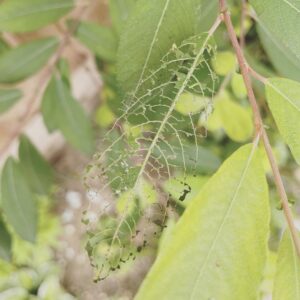
Identifying Garden Pests:
- Regularly inspect your plants for any signs of damage, discoloration, or distortion
- Look for any insects, eggs, or larvae on the leaves, stems, and flowers of your plants
- Use a magnifying glass to closely examine any suspicious areas or pests
- Research common garden pests in your area to identify which ones are likely to affect your plants
Precautions to Take When Using Soapy Water on Different Types of Plants
When using soapy water on plants, it is important to take some precautions to avoid damaging your garden:
- Test on a small area first: Before applying soapy water to your entire plant, test it on a small area first to make sure it does not cause any damage or discoloration.
- Dilute the solution: Use a mild soap and dilute the solution according to the instructions. A solution that is too strong can damage the plant.
- Avoid spraying in direct sunlight: Spraying soapy water on plants in direct sunlight can cause the leaves to burn. It is best to apply it early in the morning or late in the afternoon.
- Rinse the plant: After applying soapy water, rinse the plant with water to remove any excess soap residue.
By taking some precautions and identifying the pests in your garden, you can use soapy water to protect your plants from damage without using harsh chemicals.
How to make soapy water for pest control
Here is how to make soapy water for pest control:
Ingredients:
- 1 tablespoon of mild liquid soap or insecticidal soap
- 1 quartz of water
- Optional: a few drops of essential oil (such as peppermint or lavender) for added pest-repellent properties
Instructions:
- Fill a large container (such as a bucket or watering can) with 1 gallon of water.
- Add 1 tablespoon of mild liquid soap or insecticidal soap to the water.
- If desired, add a few drops of essential oil to the mixture for added pest-repellent properties.
- Stir the mixture gently to combine.
The amount of soap to use can vary depending on the type and concentration of the soap. It is important to use mild soap or insecticidal soap that is safe for use on plants. Using too much soap can damage or even kill plants, so it is recommended to start with a small amount and gradually increase the concentration as needed.
When storing and using soapy water insecticide, keep the following tips in mind:
- Store the mixture in a clean, labeled container and keep it out of reach of children and pets.
- Use the mixture within a few hours of making it for best results.
- Avoid applying the mixture to plants during the hottest part of the day or when the plants are under stress.
- Always test the mixture on a small, inconspicuous area of the plant before applying it to the entire plant.
- Rinse the plants with clean water after applying the solution to remove any soap residue.
- Use the mixture in moderation to avoid damaging the plants or disrupting the ecosystem balance of the garden.
Dawn dish soap insecticide recipe
Dawn dish soap can be used to make a homemade insecticide that is effective against some garden pests. Here is a recipe for making a dawn dish soap insecticide:
Ingredients:
- 1 tablespoon of Dawn dish soap
- 1 quart of water
- Optional: a few drops of essential oil (such as peppermint or lavender) for added pest-repellent properties
Instructions:
- Fill a spray bottle with 1 quart of water.
- Add 1 tablespoon of Dawn dish soap to the water.
- If desired, add a few drops of essential oil to the mixture for added pest-repellent properties.
- Shake the spray bottle gently to combine the ingredients.
When using the Dawn dish soap insecticide, keep the following tips in mind:
- Test the mixture on a small, inconspicuous area of the plant before applying it to the entire plant.
- Spray the mixture directly on the pests and on the areas of the plant where they are present.
- Avoid spraying the mixture on plants during the hottest part of the day or when the plants are under stress.
- Rinse the plants with clean water after applying the solution to remove any soap residue.
- Use the mixture in moderation to avoid damaging the plants or disrupting the ecosystem balance of the garden.
Does soapy water kill ants?
Yes, soapy water can be an effective method for killing ants. When sprayed directly on ants, the soapy water can disrupt the ants’ cell membranes and cause them to dehydrate and die.
However, it is important to note that soapy water may not be effective against all species of ants, and it may not be a permanent solution to an ant infestation.
Additionally, using too much soap can damage or kill plants, so it is important to use mild soap and avoid spraying the mixture on plants during the hottest part of the day or when the plants are under stress.
It is recommended to test the mixture on a small, inconspicuous area of the plant before applying it to the entire plant.

How to Apply Soapy Water Insecticide in Your Garden
Here are some instructions on how to apply soapy water insecticide in your garden:
- Mix the soapy water insecticide according to the recipe, using mild soap and testing the mixture on a small, inconspicuous area of the plant before applying it to the entire plant.
- Choose a time to spray the plants when they are not under stress and the weather is mild. Early morning or late evening are often good times to spray.
- Test the spray on a small area of the plant to ensure that it does not cause any damage. If the plant shows signs of damage, adjust the mixture or dilute it further before spraying the entire plant.
- Spray the soapy water directly on the pests and on the areas of the plant where they are present. Avoid spraying the mixture on beneficial insects or on the leaves of the plant that are not affected by pests.
- Reapply the soapy water insecticide every 2-3 days until the pests are under control. Once the pests have been eliminated, you can discontinue the use of the insecticide.
Here are some precautions to take when applying soapy water insecticide:
- Do not spray plants during the hottest part of the day, as the sun can cause the soapy water to dry too quickly and damage the plant.
- Do not spray plants that are under stress, as this can cause further damage.
- Be sure to rinse the plants with clean water after applying the solution to remove any soap residue.
- Use the mixture in moderation to avoid damaging the plants or disrupting the ecosystem balance of the garden.
Benefits of using soapy water for garden pest control
There are several benefits to using soapy water for garden pest control instead of pesticides:
- Eco-Friendly: Soapy water is a natural and non-toxic solution for pest control, making it an environmentally friendly option that is safe for humans, pets, and beneficial insects.
- Cost-Effective: Soapy water is an inexpensive alternative to pesticides and can be easily made with items that are commonly found in most households.
- Easy to Use: Applying soapy water is a simple process that requires no special equipment or training.
- Effective: Soapy water can be an effective solution for controlling a wide range of garden pests, including aphids, mites, mealybugs, and whiteflies.
- Safe for Plants: Soapy water is generally safe for most plants, as long as it is used in moderation and rinsed off with clean water after application.
In addition to its effectiveness and affordability, soapy water is also safe for the environment. Unlike chemical pesticides, soapy water does not leave harmful residue in the soil or water supply. This makes it a sustainable solution that supports the health of the ecosystem as a whole. Additionally, soapy water does not pose any health risks to humans or pets, making it a safe and accessible option for garden pest control.
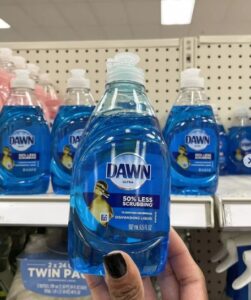
Drawbacks of using soapy water for garden pest control
While using soapy water for garden pest control has many benefits, there are also some drawbacks to consider:
- Potential plant damage: Soapy water can be harsh on some plants and may cause damage if not used properly. Overuse or applying too strong a solution can cause burns or dry out of leaves.
- Limited effectiveness on certain pests: While soapy water can be effective against many garden pests, some pests may be resistant to it or require additional methods of control.
- Short-lived effects: Soapy water insecticide has a short-lived effect and may require frequent reapplication to keep pests under control.
- Risk of disrupting beneficial insects: Soapy water may also affect beneficial insects such as ladybugs or lacewings, which are natural predators of garden pests.
To avoid damaging your plants, it’s essential to follow these tips:
- Test on a small area: Before applying soapy water insecticide to all plants, test a small area to check for any adverse reactions.
- Dilute properly: Ensure that you dilute the soap solution appropriately to avoid causing harm to plants. Use a mild soap and follow the recommended dilution ratio.
- Apply carefully: Apply the soapy water insecticide directly to the pests, rather than spraying the entire plant. Avoid spraying in direct sunlight or hot weather to prevent burning the leaves.
- Rinse off: After applying soapy water, rinse off the plants with clean water to prevent any residue buildup.
Soapy water can be a useful and eco-friendly solution for garden pest control, but it is important to use it properly to avoid any potential drawbacks. With the right precautions, soapy water can be an effective and safe option for managing pests in your garden.
FAQs
Is soapy water safe for all plants?
Soapy water is generally safe for most plants when used in the right concentration. However, some plants may be more sensitive to soap than others. It is recommended to test a small area of the plant before applying soapy water to the entire plant. Additionally, it’s important to avoid using soapy water on plants that are particularly delicate or have a waxy coating, such as ferns or succulents, as this could damage the plant.
Can soapy water harm beneficial insects?
Soapy water can harm beneficial insects if used in excess or if applied directly to the insects. However, if used properly, soapy water can be an effective and safe alternative to chemical pesticides. To minimize harm to beneficial insects, it’s important to only spray the affected areas of the plant and not the entire plant. It’s also a good idea to avoid spraying during the early morning or late evening when beneficial insects are most active.
How long does it take for soapy water to kill garden pests?
The amount of time it takes for soapy water to kill garden pests depends on the type of pest and the concentration of the soapy water. In general, insects will begin to die within minutes of being sprayed with soapy water. However, it may take several applications to completely eradicate an infestation. It’s important to note that soapy water is not a long-term solution and should be used in combination with other pest control methods to prevent re-infestations.
Does soapy water work on all types of garden pests?
Soapy water can be effective against a variety of garden pests, including aphids, spider mites, whiteflies, and mealybugs. However, some pests may be more resistant to soapy water than others. Additionally, some pests may require repeated or prolonged exposure to soapy water to be effectively controlled.
Can soapy water be used as a preventative measure against garden pests?
Yes, soapy water can be used as a preventative measure against garden pests. By regularly spraying your plants with a mild soapy water solution, you can help deter pests from infesting your garden in the first place. However, it’s important to note that excessive use of soapy water can also harm your plants, so it’s important to follow proper application guidelines.
Is soapy water insecticide safe for pets and humans?
Soapy water insecticide is generally considered safe for pets and humans, as long as it is used properly. However, it’s important to keep in mind that even natural pesticides can be harmful if ingested or applied improperly. To minimize any potential risks, it’s recommended to keep pets and children away from treated plants until the solution has fully dried.
Conclusion
Soapy water is a great natural pesticide that can effectively control many common garden pests. It is safe for the environment, humans, and pets, and it is also inexpensive and easy to make. The benefits of using soapy water for pest control include its effectiveness, affordability, and eco-friendliness.
However, it is important to note that soapy water may not work on all types of pests and it should be used with caution on certain plants.
To make the most out of soapy water insecticide, it is recommended to properly identify the pests and apply the solution at the right time and frequency. As with any other pesticide, it is important to take precautions when using soapy water to prevent any potential negative effects on your plants.
Overall, using soapy water insecticide is a great way to control pests in your garden without harming the environment or your loved ones. We encourage you to give it a try and share your experiences and thoughts in the comments section below. Let’s work together to create a healthier and more sustainable environment for ourselves and future generations.
